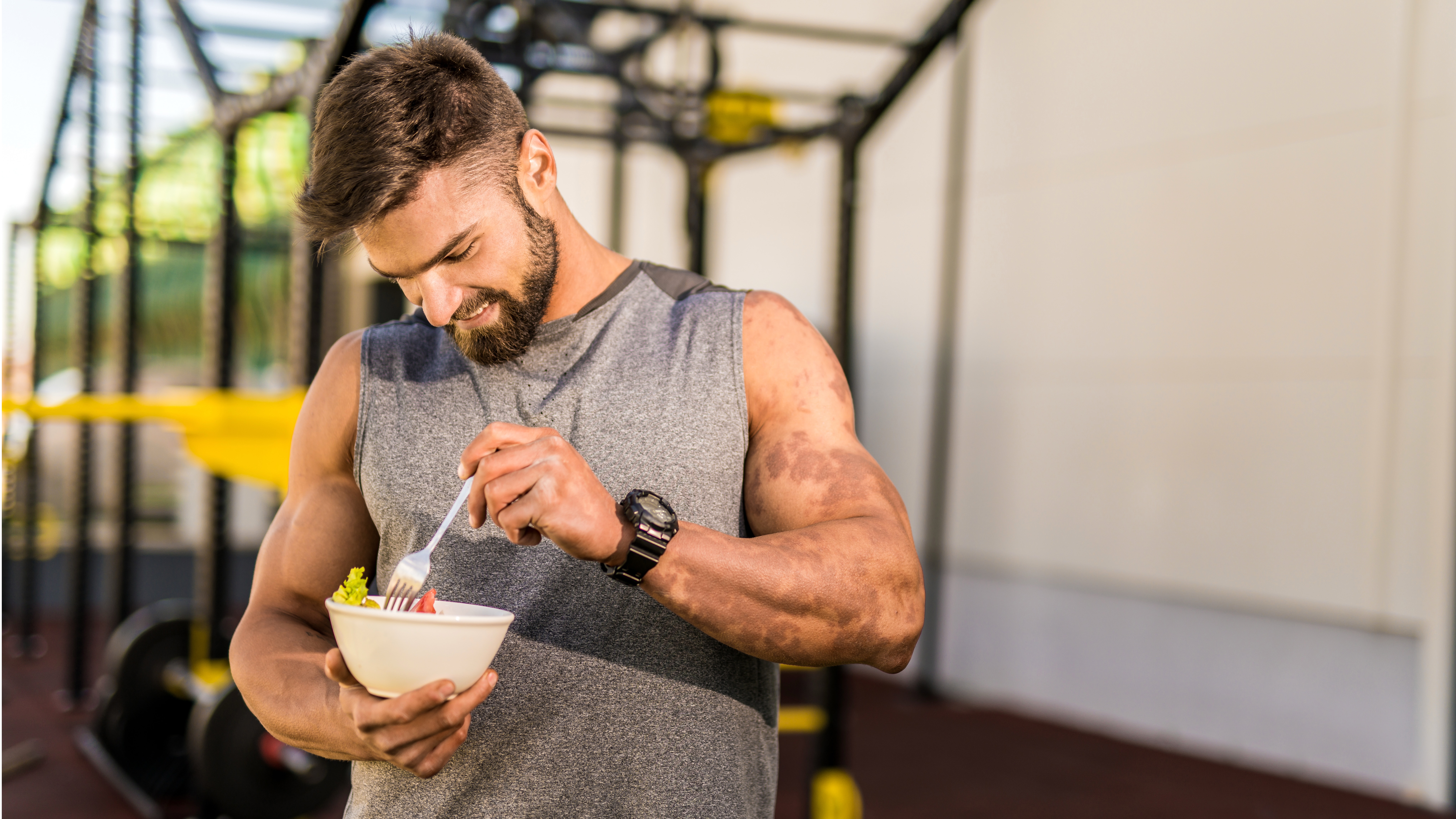I ditched eggs and went vegan for a whole month 5 years ago — here's why I've stuck with it ever since
One big change turned out to be quite an easy one

I always found the problem with January challenges or New Year's Resolutions is that they're too rigid. Life isn't as structured as your typical work day, with easily fillable slots of time to dedicate to your new routine. That's why I always avoided them. That was, until I joined in with Veganuary five years ago.
The annual 'eat vegan' one-month challenge has been running for just over a decade now, and after watching The Game Changers on Netflix (a documentary about vegan athletes) in December 2019, I decided to sweep away all the eggs, meat, and dairy for January.
I used to eat eggs every day for lunch, so even just that was a big switch, but I thought it sounded like a fun, creative challenge to find something new to eat that was entirely plant-based. And, in the end, I enjoyed the practice and benefits so much, I stuck with a vegan diet ever since. Here's why.
What is Veganuary?
Veganuary is an annual event held every January, where the aim is to ditch animal products like meat, dairy and eggs for a month in the new year. The UK-based charity behind it doesn't expect everyone who takes part to switch to veganism full-time or even to have an entirely vegan January.
Instead, the goal is to encourage more people to make meat and dairy-free meals a regular part of their routine. According to Veganuary, this helps boost your health, reduce animal suffering, and lessens the impact of food production on the environment.
You don't need to sign up to the program to take part, although if you do, then you get access to the official Veganury plan, with 10 meal plans, a celebrity cookbook, daily coaching emails, and nutrition guides.
The timing lines up neatly with everyone's New Year's Resolutions, which was a big help for me when I decided to try it. I had the time between Christmas and January 1st to think about how I'd make it fit with my lifestyle, and then I rode headlong into the challenge when I woke up on New Year's Day.
1. I felt better
As with all things related to the human body, it's hard to pluck one factor out and attribute changes specifically to that. But after switching to a plant-based diet for several weeks, I felt better in myself. I was sleeping better, didn't bloat as much after food, and had more energy than before.
How much of this was solely down to the changes I made to my food is up for debate, but during the Veganuary challenge, these changes felt significant enough that I wanted to keep it going. I also found it easier to make other small adjustments now that I felt better rested.
I started taking a 90-minute walk every morning, got a proper water bottle so that I could ditch some of the sodas I used to drink, and began to make time to actually cook more from scratch. The old college version of me from a decade ago would be in total shock that I even mostly gave up takeout.
And although the health effects will vary depending on your body and nutritional needs, I found that it around the time I switched to a fully-vegan diet, the chronic pain I felt from my long-term health condition began to ease, as did the digestive issues.
Plus, a paper published in the International Journal of Research Publication and Reviews noted that people following a vegan diet "have lower levels of cholesterol and blood pressure, as well as a reduced risk of obesity," along with improved kidney function and lower risk of high blood pressure.
2. I could still train hard
@veganuary ♬ hurricane - mette
For most of my life, people had repeated this idea that vegans are weak and deficient in all the nutrients you need to maintain your weight, build muscle, and exercise hard, but I'd watched The Game Changers on Netflix before I joined in with the month-long food challenge so knew this wasn't the case.
You definitely have to pay more attention to what you're eating and how you plan out your meals, but that's not really a bad thing. Rather than reaching for whatever convenience food was nearby, I started cooking from scratch, learned more about what went into my food and began to experiment more.
This is also how I came to test vegan cookbooks for Fit&Well a few years ago, finding new recipes, including my now-favorite scrambled tofu from America's Test Kitchen which neatly replaced my previous daily scrambled egg habit, and it's a lot cheaper too.
The biggest concern people have about a plant-based diet — protein — wasn't a problem either. Once I really dug into how much protein you need a day, I realized I was getting most of that from my food anyway — so I could skip the post-workout protein powders and save myself some money on supplements.
And I wasn't noticeably more tired, less motivated or more easily fatigued during exercise. But skipping the dairy-based protein shake after a workout made me notice how bloated that used to make me feel, when I'd always assumed it was a side effect of a period of intense movement.
3. Meat alternatives are good in small doses
In the past few years, a lot of companies making alternatives to popular meat products have popped up, like Impossible and Beyond Meat. These can be a great way to ease the transition to a plant-based diet, but I found that I didn't generally take to these, preferring to cook from scratch instead.
Of course, there are times that processed food like this is really helpful. If I go to a barbecue in the summer, it's really helpful to have a vegan patty to cook with everyone else, for convenience more than anything else. And that's where these alternatives slot in for me.
If I'm out at a restaurant, there's regularly a vegan burger on the menu, so I go for that. But at home, I buy plenty of vegetables, making sauces, and add tofu into stir fries. The only exception I regularly make is some vegan lardons to add to our plant-based carbonara (which uses tofu and nutritional yeast for the sauce).
How do you take part in Veganuary?
To take part in this year's Veganuary challenge, there's not a lot you really need to do! Of course, if you're used to eating meat, dairy, and eggs, a full month of plant-based meals might be quite a shift for you. But if you're worried it'll be too drastic a change, you can try experimenting with a couple of meals per week.
And you don't need to go fully vegan or expect to suddenly change your diet at the end of January. Veganuary is a chance to try different foods and see how you feel after reducing the amount of animal products you eat. Although I switched to a vegan diet after, you should do what feels right for you.
- Plan ahead: Deciding what you're going to eat and when it a big part of Veganuary. Plus, making a meal plan and sticking to it at the grocery store is also a great way to save money and reduce your weekly outgoings.
- Experiment: Before Veganuary, I'd never (knowingly) eaten tofu. It took a while for me to work out the best way to cook it, but now I have some almost every day, including in sauces for carbonara and fried for katsu curry.
- Don't worry: If you've never eaten a vegan diet before or have only occasionally cooked plant-based meals, it's going to take a while to figure things out. If you have a vegan meal planned but skip that for something more familiar, that's okay! The aim is to find ways to integrate more vegan foods into your routine sustainably.
- Have fun with it: Although people talk about the environmental benefits of veganism, it's also important to actually enjoy the food you eat. Instead of being restrictive, there are a lot of meat alternatives, interesting regional foods, and different restaurants to experience and make memories with.
- Speak to a medical professional: As with all changes to your diet, it's best to talk to your doctor or other healthcare professional before making drastic shifts in what you eat and drink.
More from Tom's Guide
Sign up to get the BEST of Tom's Guide direct to your inbox.
Get instant access to breaking news, the hottest reviews, great deals and helpful tips.

James is Tom's Guide's Buying Guide Editor, overseeing the site's buying advice. He was previously Fitness Editor, covering strength training workouts, cardio exercise, and accessible ways to improve your health and wellbeing.His first job at as a sales assistant in a department store, and this is where James learned how important it is to help people make purchasing decisions that are right for their needs, whether that's a fountain pen to give as a gift or a new fridge for their kitchen.
This skill stayed with him as he developed a career in journalism as a freelance technology writer and, later, as Buying Guide Editor for MakeUseOf, where his interest in fitness combined with his commitment to impartial buying advice.
This is how he came to join Fit&Well as Fitness Editor, covering beginner-friendly exercise routines, affordable ways to boost your wellbeing, and reviewed weights, rowing machines, and workout headphones.
James is an advocate for sustainability and reparability, and focuses his reviews and advice through that lens to offer objective insights as to whether a specific product or service will be right for your needs.

